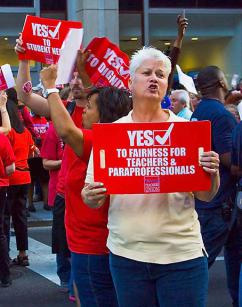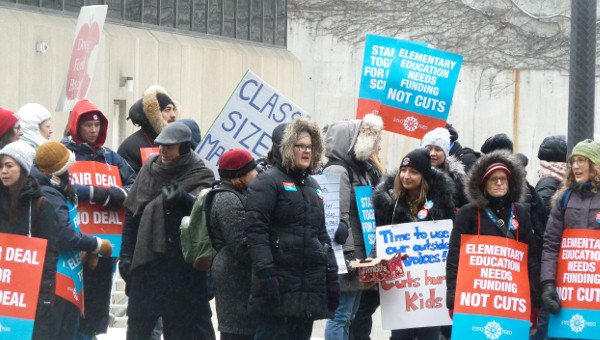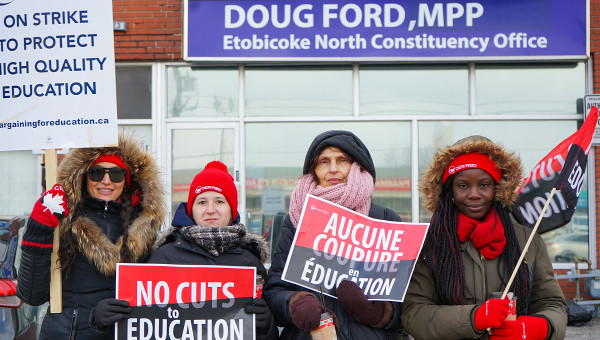Can the scrappy band of outsiders that now heads the Chicago Teachers Union (CTU) lead the kind of high-stakes fight that most labour unions have ducked? That question looms large – not just for the city’s teachers, students and their parents, but for the entire labour movement. Because while both private- and public-sector unions are taking a pounding across the U.S. with layoffs, pay cuts and pension rollbacks, the CTU is gearing up for a showdown with America’s most politically connected mayor, Rahm Emanuel – and it will come to a head in September.

At a time when most union officials are shamefacedly selling concessions as “the best we can do,” Chicago teachers are defiant. Just ask anyone who encountered the giant inflatable rat that accompanied the spirited CTU picket outside the Chicago Public Schools (CPS) offices August 22 a few hours before a school board meeting.
“We would like to have a fair compensation package that includes acknowledgement of our teachers’ experience and their educational attainment,” CTU President Karen Lewis said at a press conference after the picket. “That’s number one. Number two, our health care that they’re asking us will eat up the little bitty, tiny, miniscule raise that they’re offering.”
The Issues
An arbitrator earlier this year recommended a pay increase of 14.85 per cent, much closer to the union’s initial demand for a 30 per cent raise to cover the additional hours teachers were expected to work in the new longer school day. CPS, however, has offered only a 2 per cent raise, which doesn’t even make up for the teachers’ previously negotiated 4 per cent raise that was cancelled by the board last year.
Later on August 22, CTU delegates held a meeting at a high school where they picked up freshly printed picket signs and got a sober update on contract negotiations.
While CPS and Emanuel bowed to a union demand in July to hire nearly 500 more teachers to staff a longer school day, school negotiators have refused to budge on what the union considers to be strike issues. Those include merit pay, the cancellation of raises based on seniority, and higher health insurance costs.
The city’s aggressive posture led to a strong turnout for informational picket lines at CPS’s early-start schools, about one-third of the more than 600 in the system. While some pickets were modest, many more were large and spirited, and most got strong support from parents and community members.
The mobilization is quite an achievement for the CTU leadership, which took office in June 2010 on the slate of the Caucus of Rank-and-File Educators (CORE). Taking over a budget-strapped and dysfunctional union machine, the new leadership began by cutting officers’ pay and putting the money into organizing.
“Win or lose, the CTU was determined to deepen the union’s connection to the wider fight for education justice in the city.”
In its first round of negotiations, the CTU leadership spurned the usual union strategy of taking pay cuts to avoid layoffs, arguing that concessions would lead to only further concessions. The new CTU also plunged into the fight against school closures despite the small chance of prevailing in that struggle. Win or lose, the CTU was determined to deepen the union’s connection to the wider fight for education justice in the city.
In April 2011, the CTU leadership overcame an internal crisis over whether to support an anti-union law known as SB 7, which requires 75 per cent of all union members to vote to authorize a strike. Little more than a year later, nearly 90 per cent of all CTU members – and 98 per cent of those who cast a ballot – supported giving union leaders strike authorization.
That vote – which followed an inspiring May 23 rally of more than 5,000 union members – showed the city that the CTU was mobilizing its members not simply through the union’s organizational machinery, but as part of a wider working-class movement to defend public education from corporate-backed education reformers and charter school operators.
What began as a vision of a small group of CORE activists a few years earlier had come to life in a fighting CTU, a union that embodies the best hopes not only for teachers’ unions, but all of organized labour.
High Stakes
The stakes are high for Rahm Emanuel, too. The former White House chief of staff under Barack Obama got his political start as an operative for former Mayor Richard M. Daley, and now, he wants to make his own mark as the city’s boss.
But where Daley and his father, Richard J. Daley, used patronage jobs to bind labour to the Democratic machine, Emanuel wants to gut public-sector unions while dangling jobs to keep others on board. Emanuel’s message to union leaders: Do it the easy way by selling concessions to your members, or expect the hard way, where City Hall proceeds to crush you.
As a result, most Chicago unions have already rolled over for Emanuel without a fight. For example, the Teamsters, who backed Emanuel for mayor, signed off on the mayor’s privatization of waste collection, bought off by a promise that their lower-paid union members at private companies would get the work.
The building trades are on board with Emanuel’s Infrastructure Trust plan to fund public works, even though it will put the city in hock to big banks at unspecified rates of interest for decades to come. And the Chicago Federation of Labor signed on to Emanuel’s “wellness” plan that empowers monitors to track city employees’ weight loss, smoking habits and other personal information – and raises their health insurance costs by $600 per year if they don’t sign up for the program.
Next, Emanuel’s operatives at CPS moved to drive a wedge between the CTU and the other main unions that represent school employees. Service Employees International Union (SEIU) Local 73 and UNITE HERE Local 1 – usually seen as progressive within the local labour movement – signed early contracts with the school board.
This could set the stage for SEIU and UNITE HERE members being contractually forced to cross teacher picket lines and staff proposed “student centers” that CPS plans to run in case of a strike, at a cost of $25-million. The International Union of Operating Engineers, whose members keep the school buildings running, also cut a separate deal.
Emanuel’s latest effort to isolate the CTU is an early contract with the faculty at the city’s community colleges, who belong to a sister union to the CTU. The deal, which is being pushed to a ratification vote on a week’s notice, is made to City Hall’s specifications – it eliminates raises based on experience and education, establishes the principle of merit pay, and includes the onerous wellness program. Those are precisely the concessions that Emanuel wants to impose on the CTU.
But despite Emanuel’s efforts to peel away Chicago labour leaders, backing for the CTU is strong among union members and at least some officials.
AFSCME Council 31, which tangled with Emanuel to defend library jobs and other public employees, has endorsed a CTU Labour Day march that will conclude with protesters joining hands around City Hall.
And support for Chicago teachers goes far beyond the ranks of organized labour. According to a Chicago Tribune opinion poll in May, far more people trust the CTU on education issues than Rahm Emanuel. That’s in part because the mayor overplayed his hand over the course of this year, ramming through the closure and “turnaround” of 17 schools, while pushing a longer school day without adequate funding. A City Hall-connected effort to pay preachers to organize pro-Emanuel protests backfired when the media caught wind of the scheme.
In recent weeks, the CTU has been holding public meetings in neighborhoods around the city to receptive audiences. Community alliances forged by CORE to fight an earlier round of school closings years ago laid the basis for a strong CTU alliance with key community organizations in African American and Latino communities. A CTU float at this year’s Gay Pride march got big cheers. The union has also backed the effort by Communities Organized for Democracy in Education to replace Emanuel’s handpicked school board with an elected one.
More recently, the Chicago Teachers Solidarity Campaign (CTSC) was launched to bring together a range of labour and social movement activists, linking ongoing battles over public education in the city with the CTU’s struggle. The solidarity campaign is building a August 29 town hall meeting to bring together the CTU’s allies, as a possible strike looms.
Thus, while Emanuel will try to portray the CTU’s struggle as one of greedy teachers versus needy kids, there’s a growing movement to defend public education that sees justice for teachers as essential for the education of Chicago’s children.
Union Solidarity
While the CTU is resolved to do what it takes to win – including a strike – questions remain over the role of its parent union, the American Federation of Teachers (AFT). The AFT convention in Detroit held in July gave a powerful statement of solidarity for its members in Chicago. Delegates also gave backing to AFT teachers in Douglas County, Ariz., where school authorities have imposed a contract on the union, as well as Detroit, where an emergency financial manager unilaterally cut pay by 10 per cent on top of previous rounds of concessions and job losses.
Michael Mulgrew, president of the United Federation of Teachers in New York City, captured the mood when he said, “You come after one of us, you deal with all of us.” But the union’s policies of collaboration, highlighted earlier in convention proceedings, undermined that call to action.
For example, the AFT affiliate in Cleveland worked with anti-union Republican Gov. John Kasich to craft a contract eliminating seniority protection in layoffs while backing legislation that allows charter schools to compete with traditional schools for taxpayer dollars. Instead of pointing to the agreement as a disastrous setback, AFT President Randi Weingarten portrayed it as a gain in her opening speech.
In fact, Weingarten, who two years ago proposed a strategic retreat for the union by announcing a partnership with school reformers like Bill Gates, now finds herself presiding over a rout of the union in some of its historic bastions, such as Philadelphia, where the mayor and school officials are in the process of turning over the entire school system to academic institutions and charter school management organizations.
As a result, the convention proceedings veered between sober recognition of the scale of the assault and the high-production videos and feel-good presentations typical of U.S. unions at their stage-managed meetings – crowding out any lengthy discussion of the major issues facing teachers.
The resolution books were skimpy for a union that claims 1.5 million members – a figure that includes retirees – and largely avoided mention of issues like merit pay, which the AFT folded on years ago. Also largely ignored was the union’s surrender on job security based on tenure – a posture that has only encouraged the school reform crowd to step up their attacks.
AFT delegates did pass resolutions with policies well to the left of mainstream Democratic Party election programs. But those feel-good votes gave way to practical politics when Weingarten welcomed Vice President Joe Biden to the podium, despite the Obama administration’s anti-union Race to the Top legislation.
Notably, CTU President Karen Lewis refused to join the other AFT vice presidents on stage to greet Biden, and the Chicago delegations made a point of wearing their red union t-shirts rather than the Obama-Biden ones handed out by AFT officials.
The result was a convention in which the AFT came across as progressive in general political terms, but at best incoherent on the bread-and-butter issues dear to teachers – a union unable or unwilling to take a consistent stand on what had been fundamental union positions.
That’s why the CTU’s struggle in Chicago is so important. Four years after the financial crash of 2008, politicians and employers are still using high unemployment and tight budgets to try to permanently cripple organized labour while dismantling what remains of decent social services – and public education is in the crosshairs.
High-stakes battles that put the union on the line are inevitable. The Chicago Teachers Union is stepping up to that challenge – and it deserves our full support. •
This article first appeared at Socialist Worker.





